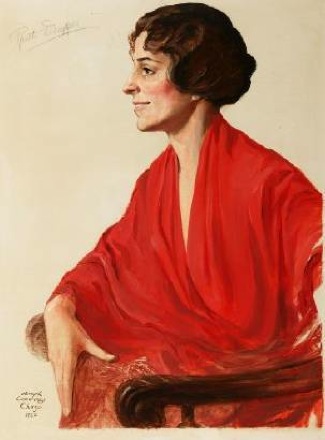Music |
Ruth Draper
By
Published: Jul 31, 2023
Category:
Spoken Word
At the start of her career, Ruth Draper asked Henry James, a family friend, for advice about her future, whether she ought to pursue a career as a conventional actress or playwright. His advice: “My dear child, you have woven your own little Persian carpet. Stand on it!” She did, and literally contained multitudes. As Kenneth Tynan, the English critic and dramatist, put it, “It seems, in passing, absurd to use a singular verb in connection with so plural a player… Ruth Draper are now at the height of their career.” After her death, Draper gave birth to Lily Tomlin and every other female performer who stands up and tells stories.
Her best-known monologue begins in a grand 1920s home, where a New York society matron’s Italian lesson is just beginning.
“‘Midway along the pathway of our life,'” she recites with a trill, “‘I found myself in a forest dark’ — we say: a dark forest, don’t we? — ‘because the direct way was lost.'”
But her reading of her beloved Dante (“Dante and Shakespeare: they seemed to know everything”) proceeds no further. First she calls a friend for a quick gossip. Then she consults with the cook, plays with a new puppy, gets her husband’s golf clubs to him, disposes of symphony tickets, thrills to her lover’s call. And so on for 28 minutes as Draper adjusts her voice for each caller so precisely that, by the end, we know almost everything about this woman — and her world. [To hear Draper do “The Italian Lesson,” click here.]
Draper (1884-1956) considered herself a character actress, not some sort of stand-up performer. Until recently, we had no footage of her vast repertoire of sketches — we had to make do with 38 seconds of a 1937 home movie.
In June of 2021, an angel dropped a 10:25 video on YouTube: a video of “The Children’s Party.” It was recorded in 1956, for Omnibus. Alistair Clarke introduced her. Timing is everything: Ruth Draper died two months later.
And it was only near the end of her life that she consented to record her monologues. Thanks to Susan Mulcahy, a journalist with a passion for Draper, these long-unavailable recordings are now on CD. No need to dress up. Just close your eyes and listen. [The Audio CD is unaffordable. The MP3 download is what you want. To buy it from Amazon, click here. For a biography, “The World of Ruth Draper: A Portrait of an Actress,” click here.]
Draper’s talent made her a sensation on both sides of the Atlantic. She had only to place a small advertisement in a newspaper to sell out a theater. As a member of Society, she was comfortable playing to high-toned audiences and visiting friends like Edith Wharton and Henry James. And her fans included the century’s most discerning figures: Noël Coward, John Gielgud, Katharine Hepburn.
What were they cheering? A woman standing alone.
“The people who come have to use their own imaginations to get the effect, and they appreciate that,” Draper said in a rare interview. “There is no scenery, no person except myself on the stage. The others are the joint product of my own and the audience’s imagination.”
Twenty years ago, I heard a scratchy record of Draper morphing from the matron of “The Italian Lesson” to a Scottish immigrant to a Maine dowager. Her mimicry was exact. But what made the recordings unforgettable was her empathy. She identified with each of her characters; she was, as a critic described her, a modern-day Jane Austen. “I never try to point morals in my monologues,” she said. “I believe the material has got to go deeper into human life and human feeling.”
When a companion said of a Draper performance, “Have you ever seen such acting?” George Bernard Shaw shot back: “That’s not acting, that’s life!”
In April, 2023, the Boston Modern Orchestra Project released the recording of Lee Hoiby’s one-woman chamber opera, “The Italian Lesson,” featuring Janna Baty. To sample and buy it, click here. [Thanks, Daniel Hobbs]


